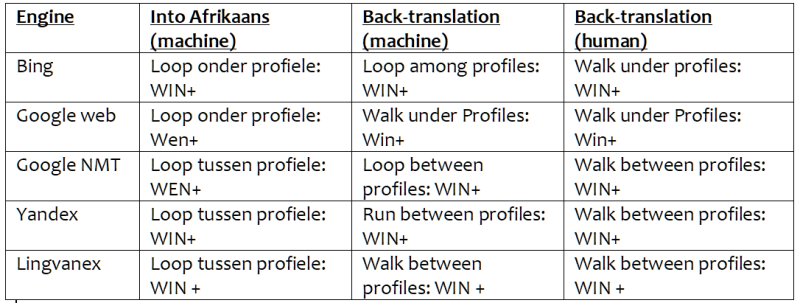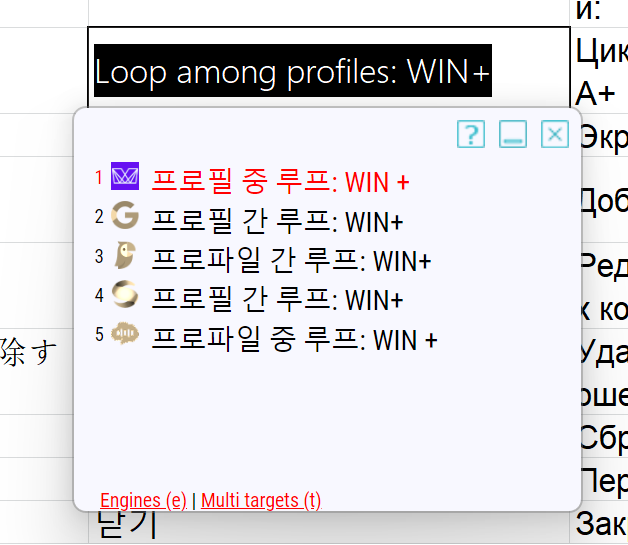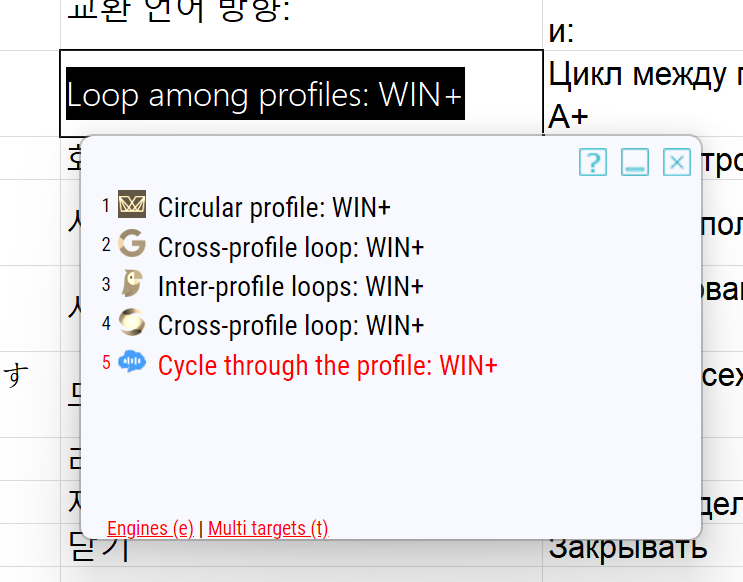Checking a machine's translation using back-translation Thread poster: Samuel Murray
|
|---|
Samuel Murray 
Netherlands
Local time: 20:11
Member (2006)
English to Afrikaans
+ ...
Hello everyone
Shouguang Cao recently posted about a method of checking a machine translation's validity in multiple engines by doing a back-translation of it in those engines. Unfortunately, Shouguang committed the cardinal sin of mentioning a product name in his post, so his useful little trick got removed off of the forum, but the trick is worth looking into anyway.
... See more Hello everyone
Shouguang Cao recently posted about a method of checking a machine translation's validity in multiple engines by doing a back-translation of it in those engines. Unfortunately, Shouguang committed the cardinal sin of mentioning a product name in his post, so his useful little trick got removed off of the forum, but the trick is worth looking into anyway.
Most web-based machine translate systems have a back-translate feature, whereby you click the arrows between the two boxes, and it performs a back-translation of its own forward-translation. (There are also apps that show translations and back-translations for multiple machines on a single screen, but don't mention them here.)
FWIW, here is what happens in Afrikaans with this test segment:
Loop among profiles: WIN+

The odd thing here is that all five machines translate the English word "loop" in Afrikaans as "loop" (which mean "to walk" or "to run"). The Afrikaans word "loop" can never mean "to loop" in English. What I suspect happened here is that the machines could not find an Afrikaans translation for "loop" and so they just inserted the source text word.
Both Google machines translated "win" as "wen", which means to have a victory. This is an example of how a back-translation doesn't alert you to a mistranslation because the correct back-translation of "wen" into English is also "to win".
Curiously, Bing and Google NMT back-translated the Afrikaans word "loop" as "loop" in English, which makes no sense whatsoever -- there is no context in which the Afrikaans word "loop" would mean "to loop" in English.
I did not attempt a human translation of the source text because it is a very difficult text to translate. There is no established Afrikaans word for "to loop" in the sense of switching between multiple options sequentially. "To loop a rope through a hole", well, that does exist in Afrikaans, but sharing a spliff between friends and calling it "to loop a joint" doesn't. So let's not be too upset with the machines for taking the quick way out.
What happens in your language combinations?
[Edited at 2022-08-29 08:21 GMT] ▲ Collapse
| | | |
Hi Samuel,
I am glad still that you saw the post. Back-translation works in some cases to eliminate completely wrong translations when translating into a language we do not know. I guess it's probably true with most language pairs.
As a background to your post, here is a screenshot of using multiple MT engines:

I do not kno... See more Hi Samuel,
I am glad still that you saw the post. Back-translation works in some cases to eliminate completely wrong translations when translating into a language we do not know. I guess it's probably true with most language pairs.
As a background to your post, here is a screenshot of using multiple MT engines:

I do not know Korean and I don't know which translation is better. But with back translation, I get a rough idea of what each Korean translation is about:

Another trick to make things easier is to rewrite the original English sentence. When we find asking MT to translate "Loop" to Afrikaans is difficult, change it to "Switch profiles".
Samuel Murray wrote: Hello everyone Shouguang Cao recently posted about a method of checking a machine translation's validity in multiple engines by doing a back-translation of it in those engines. Unfortunately, Shouguang committed the cardinal sin of mentioning a product name in his post, so his useful little trick got removed off of the forum, but the trick is worth looking into anyway. Most web-based machine translate systems have a back-translate feature, whereby you click the arrows between the two boxes, and it performs a back-translation of its own forward-translation. (There are also apps that show translations and back-translations for multiple machines on a single screen, but don't mention them here.) FWIW, here is what happens in Afrikaans with this test segment: Loop among profiles: WIN+  The odd thing here is that all five machines translate the English word "loop" in Afrikaans as "loop" (which mean "to walk" or "to run"). The Afrikaans word "loop" can never mean "to loop" in English. What I suspect happened here is that the machines could not find an Afrikaans translation for "loop" and so they just inserted the source text word. Both Google machines translated "win" as "wen", which means to have a victory. This is an example of how a back-translation doesn't alert you to a mistranslation because the correct back-translation of "wen" into English is also "to win". Curiously, Bing and Google NMT back-translated the Afrikaans word "loop" as "loop" in English, which makes no sense whatsoever -- there is no context in which the Afrikaans word "loop" would mean "to loop" in English. I did not attempt a human translation of the source text because it is a very difficult text to translate. There is no established Afrikaans word for "to loop" in the sense of switching between multiple options sequentially. "To loop a rope through a hole", well, that does exist in Afrikaans, but sharing a spliff between friends and calling it "to loop a joint" doesn't. So let's not be too upset with the machines for taking the quick way out. What happens in your language combinations? [Edited at 2022-08-29 08:21 GMT]
[Edited at 2022-08-29 11:29 GMT] ▲ Collapse
| | | | Mr. Satan (X)
English to Indonesian
| Re: Back-translation | Aug 29, 2022 |
Samuel Murray wrote:
What happens in your language combinations?
English-Indonesian language pair. I got pretty much the same results.

There’s no “loop” in our vocabulary (the word itself, not the equivalent of it in the TL). This is definitely the MTs just copy-pasted the source word into the TL to fill in the blanks. DeepL did provide a good alternative for this word in its back-translation. But still, I’d avoid DeepL’s suggestion as a whole, since the translation sounds unidiomatic to me. If I didn’t speak Indonesian, I wouldn’t know this. DeepL and Google also translated “WIN” as “MENANG” (to have a victory) in my native language.
Likewise, I didn’t attempt to translate this segment since I don’t even know what the context is all about. All MTs were web-based. I didn’t have the time to mess around with API and all that malarkey.
[Edited at 2022-08-29 13:13 GMT]
| | | | Edwin den Boer 
Netherlands
Local time: 20:11
Member (2009)
English to Dutch
| Another kind of loop | Aug 30, 2022 |
You'd expect the results for Dutch to be similar to Afrikaans, but Bing and Lingvanex interpreted 'loop' as a noun: lus tussen profielen, which will go unnoticed when you rely on the back-translation. This is an example of why I don't like to supply back-translations, unless it's possible to give a full explanation for a small number of strings. Another thing that won't show up in the back-translation is choosing the infinitive or the imperative while translating a verb from English (or A... See more You'd expect the results for Dutch to be similar to Afrikaans, but Bing and Lingvanex interpreted 'loop' as a noun: lus tussen profielen, which will go unnoticed when you rely on the back-translation. This is an example of why I don't like to supply back-translations, unless it's possible to give a full explanation for a small number of strings. Another thing that won't show up in the back-translation is choosing the infinitive or the imperative while translating a verb from English (or Afrikaans) to Dutch.
GT showed different results depending on capitalization:
loop between profiles: WIN+ = lus tussen profielen: WIN+ = loop between profiles: WIN+
Loop between profiles: WIN+ = Loop tussen profielen: WIN+ = Walk between profiles: WIN+
I'd translate this phrase as Schakelen tussen profielen, which translates back as Switch between profiles.
[Edited at 2022-08-30 07:54 GMT] ▲ Collapse
| | |
|
|
|
Samuel Murray 
Netherlands
Local time: 20:11
Member (2006)
English to Afrikaans
+ ...
TOPIC STARTER
Edwin den Boer wrote:
I'd translate this phrase as Schakelen tussen profielen, which translates back as Switch between profiles.
That would have been my Afrikaans translation, too (wissel tussen profiele --> switch between profiles).
And yes, it's curious how just changing a comma or a capital letter or just a small word causes the machine to change the translation:
Google Translate web:

Yandex Translate web:

The first Google hit is the only one to translate "fruit flies" correctly as an insect. None of them correctly translated the second "like" in the correct sense of "to have a favourable impression of". Google got the translation of "time" correct in both sentences, but only the third sentence in Yandex did. And for some reason, the first sentence of Yandex uses the diminutive of "arrow", which would actually be a mistranslation, because "pyltjie" refers to an arrow image, icon or cursor, and not to an arrow that is shot from a bow.
Of course, this is not a good candidate for back-translation testing because the sentence is designed to trick the machine, but it shows how just changing one little thing can affect the machine's translation in unexpected ways.
| | | | To report site rules violations or get help, contact a site moderator: You can also contact site staff by submitting a support request » Checking a machine's translation using back-translation | Wordfast Pro | Translation Memory Software for Any Platform
Exclusive discount for ProZ.com users!
Save over 13% when purchasing Wordfast Pro through ProZ.com. Wordfast is the world's #1 provider of platform-independent Translation Memory software. Consistently ranked the most user-friendly and highest value
Buy now! » |
| | Trados Studio 2022 Freelance | The leading translation software used by over 270,000 translators.
Designed with your feedback in mind, Trados Studio 2022 delivers an unrivalled, powerful desktop
and cloud solution, empowering you to work in the most efficient and cost-effective way.
More info » |
|
| | | | X Sign in to your ProZ.com account... | | | | | |














